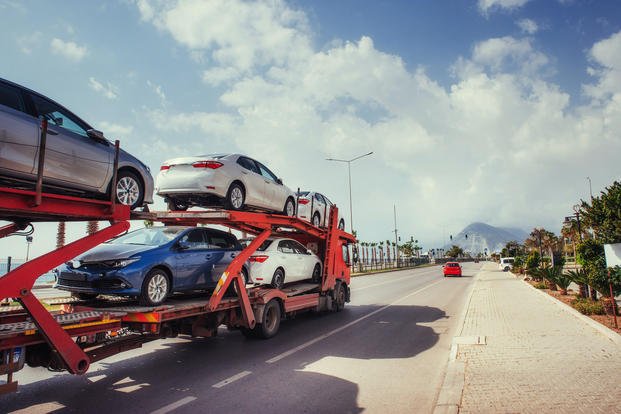The PCS orders are in and you're shipping out. Well, more accurately, driving out. After the boxes are packed and you're ready to hit the road, figuring out how to do a two-vehicle PCS can take a lot of coordination.
Trying to get two vehicles to the next location, in one piece and with minimal personal expenses are all the rage in the military spouse Facebook groups right now.
If you have questions about a two-vehicle PCS, we've got answers!
How to Do a Two-Vehicle PCS
Navigating the PCS process can seem super complicated. That's because it kind of is.
Luckily, there is a handbook that governs all Department of Defense moves for both military troops and civilian employees. Unfortunately, the Joint Travel Regulations (JTR) is a very long handbook.
The most important thing to know is that if something isn't included as a possible expense in the travel regulations handbook, then it's not allowed. Period.
The good news is that there are a lot of options for getting your car to your new duty station.
How to DIY a Two-Vehicle PCS
One option is to drive both vehicles to your next duty station. Each adult takes one vehicle and you caravan along the route. This option requires a little coordination of stops for gas, restrooms, sightseeing or overnight hotel rooms.
The benefit of this type of move is that both vehicles will rate reimbursement for mileage and gas. The JTR outlines the rules and regulations related to reimbursement in Chapter 2.
When you drive a vehicle or two, be sure to weigh your car empty and then full at your current duty station. You might be eligible for additional reimbursement for transporting part of your household goods. This is officially called a partial personally procured move (PPM), but you've probably heard it referred to as a partial DITY. When you arrive at your next duty station, be sure to re-weigh your vehicle(s).
You'll submit this paperwork, along with your gas receipts and mileage calculations, to your Travel Management Center (TMC) at your next duty station or via the online travel management portal.
How to Ship Your POV at Your Own Expense
Paying out of pocket during a PCS isn't exactly what you'd prefer. However, this may be the only choice for families with two vehicles but who can only drive one to the new military installation.
In this instance, you would hire an auto shipping company with no expectation of reimbursement from the DoD. One of the best places to ask for recommendations is in the military spouse Facebook groups. Year after year, these spouses have the best gauge on reputable companies or which businesses to avoid. You could also check Consumer Affairs, or similar business ranking websites, for reviews.
Consider the contract carefully to understand their responsibilities and your rights. You might consider running everything by base legal before you sign.
Cost and Time Considerations
Shipping rates are based on distance and there might be some slight variation between companies and individual drivers. You could call around to a few different companies to try to find the best price.
However, PCS season is very busy and spaces on your preferred dates, routes or delivery estimates could book quickly.
Shipping times can vary based on time of year, the distance between locations and other stops along the way. When you drop off your car, you'll get a general estimate about when your car will be at your next duty station.
Pick Up and Drop Off Logistics
Work with the shipping company to coordinate a pick-up time and location. Some companies will come to you for pickup. However, due to your neighborhood layout, HOA rules or base access, auto transport companies might prefer to meet at a landmark location. This could be near a base, like just outside the front gate or at a shopping center. Basically, somewhere that the driver can fit their rig.
On the other side, you'll be in contact with the driver and/or their dispatcher. Just like at drop-off, your driver might be able to meet you at your home or at your preferred address. Other times the driver might need you to meet them at a central location.
For both pick-up and drop-off, you'll be given a time window and date. Everything should get firmed up the closer it gets to the actual time. Stay in contact with your driver or dispatcher for regular updates.
Can I Pack the Car?
When you drop off your car, it's best practice to have it completely empty of everything. Sure you, technically, can have things inside, but you should really think twice.
It might be tempting to use your car to skirt those pesky rules about packing liquids or liquor. However, it might not be the best idea.
Consider that the car will be sitting out in the elements for several days to several weeks. That could mean radical temperature changes and weather extremes. Sending anything that might not react well to these conditions is probably a poor choice. You'll need another option for your expensive wine collection.
Generally, packing your car with stuff isn't a great idea. It's technically allowed, but it's frowned upon.
Your auto transporter is authorized to ship vehicles. Moving companies are authorized and contracted to handle your household goods. If your driver is found to be overweight along the way, a weigh station inspector could check the cars for non-authorized items, like your household goods, liquids and other personal property. And these non-authorized items could end up tossed out of your car, onto the road or into the trash.
Additionally, the driver will be stopping along the way to rest and refuel. While we want to hope for the best, the reality is that theft does happen. An empty car means there is nothing to steal.
Do You Need a Power of Attorney?
Are you shipping a car when your spouse is deployed or has already moved to the next location? Perhaps you're helping out a friend? It's always best practice to have a power of attorney (POA).
Many military families list the service member as the sole or primary owner of their POVs. If a spouse who is not on the registration is coordinating the car shipping process, having a POA helps ensure that everything goes smoothly.
A power of attorney proves that you have the authorization to execute the contract. Have base legal or your preferred lawyer draw up the POA.
The same is true on the receiving end. When you're picking up a car for someone else or acting for an absent spouse who is the listed owner, get a POA. Let the shipping company know upfront what is happening and share that POA in advance.
Most Important Information For Shipping Your Car During A PCS
This whole car shipping process is on your dime. The only reimbursement authorized for vehicles, per the JTR, is mileage when you are physically driving one or both cars to the next duty station. If you choose to ship a car or two, expect to pay out of pocket.
How did you get your vehicles across the country? Share your best tips in the comments!
This article originally appeared at NextGen Military Spouse.
More articles from NetGen Military Spouse:
- When The PCS Orders Change
- Hygge For The Military Spouse On The Move
- The Smart Military Spouse's Guide To PCSing With Pets
Keep Up with the Ins and Outs of Military Life
For the latest military news and tips on military family benefits and more, subscribe to Military.com and have the information you need delivered directly to your inbox.













